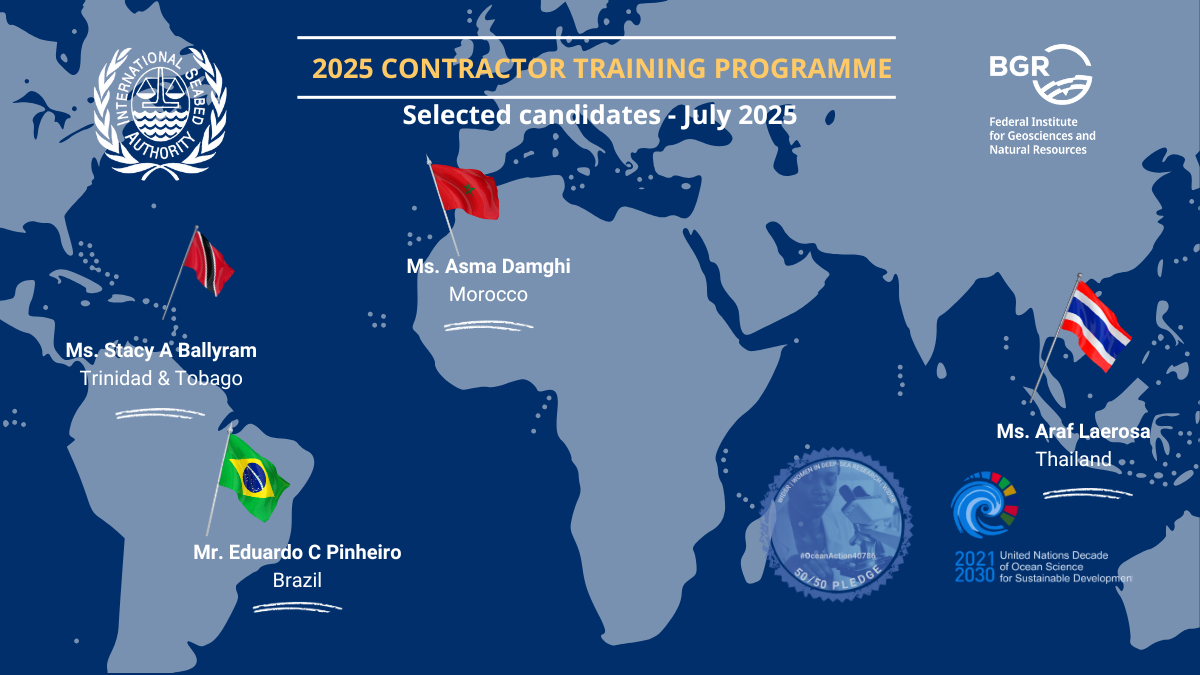
|
Rank |
Candidate | Sex | Country | Country Class. |
|
First-ranked Candidates |
||||
|
1 |
Asma Damghi |
F |
Morocco | |
|
2 |
Stacy A Ballyram |
F |
Trinidad & Tobago | SIDS |
|
3 |
Eduardo C Pinheiro |
M |
Brazil | |
|
4 |
Araf Laerosa |
F |
Thailand | |
|
Reserve or Alternate Candidates |
||||
|
R1 |
Justin Jorge R Padre |
M |
Philippines | |
|
R2 |
Ogechukwu Chinelo Iwu |
F |
Nigeria | |
|
R3 |
Heitor Valentim RV Rampini Veiga |
M |
Brazil | |
Issue Date: 3 February 2025
The Federal Institute for Geosciences and Natural Resources of Germany (BGR) in accordance with its contract for exploration for polymetallic nodules signed with the International Seabed Authority on 19 July 2006 is offering four (4) at-sea onboard training opportunities for candidates from developing States within its 2025 training programme.
Training Programme Overview:
Cruise Objectives:
The main objectives of this cruise are: (a) environmental monitoring of an area where polymetallic nodules were removed in May 2021 during a test of the Patania II collector prototype of the Belgian company Global Sea Resources (GSR), and its control site; (b) comprehensive biogeochemical assessment of trace elements, macronutrients, oxygen and carbon concentrations throughout the water column and at the sediment-water interface; and (c) sampling and faunal analyses in spatially distant (20-100 km) working areas.
Details of the programme components:
The training will take place onboard the German research vessel SONNE in the north-eastern Pacific Clarion-Clipperton Fracture Zone. The campaign which will be for 52 days at-sea will visit the eastern BGR polymetallic nodule contract area and will take place from 28 December 2025 to 19 February 2026 from/to San Diego (USA). (Note that these dates may be slightly varied depending on ship scheduling and harbour/berth availability).
Shipboard training will include:
- Instructions on vessel and deep-sea equipment navigation techniques and the planning of an environmental survey;
- Introduction into the different types of deep-sea research equipment used;
- Introduction into the functionalities and use of a “Remotely Operated Vehicle” (ROV) for benthic seafloor surveys (video/image analysis, sediment and water sampling, sampling of megafauna; deployment and recovery of monitoring equipment on the seafloor)
- Sediment and nodule sampling, description and processing for the determination of e.g. shear strengths and metal concentrations;
- Geochemical sampling of sediments, pore waters and seawater for later determination of trace metal concentrations in the home laboratories;
- Oceanographic analysis of the water column and bottom waters based on CTD data as well as current and turbidity data obtained from oceanographic moorings;
- Sampling and processing of biological samples for benthic biodiversity studies, involving fauna of all size classes;
- Instructions on the use of geophysical mapping techniques (swath bathymetric profiling, sediment echo sounding).
Eligibility:
Candidates should meet the following criteria:
- Educational Background: Candidates should hold a qualified bachelor’s degree/master’s degree in marine biology, marine environmental sciences, marine geology, geophysics, or oceanography;
- Professional Experience: At least one year of practical experience in the candidate’s field of specialisation.
- Language Proficiency: A sound knowledge of English, attested by a certificate where applicable.
- Health: Good state of mental and physical health, suitable for training at sea.
- Recommended: seagoing experience.
Nb. If selected, the trainee may be required to submit a physical examination report, signed by licensed physician, stating that the trainee is physically fit for a month-long on board training.
Financial Support:
BGR will cover all cost directly related to the training programme including: accommodation and meals on board RV SONNE; travel expenses – including international travel expenses (economy class) and local transportation from door-to-door to the harbour of embarkation and disembarkation (San Diego); visa application costs (USA); accommodation and daily allowance during travelling to and from the vessel (according to German law for travel expenses).
Other Requirements:
The selected candidates will be required to sign the ISA Contractors’ Training Programme Code of Conduct for Trainees prior to the start of the programme.
No later than four (4) weeks after the training has ended, each trainee shall submit an end-of-training report to BGR and the Authority outlining, amongst other things, the training completed, the benefits of the training opportunity, the knowledge gained and how the training will advance their career/educational pursuits. The report shall also include key performance indicators to assess the effectiveness of the training activities.
Upon successful completion of the programme and submission of the report, trainees shall receive a certificate from the Authority.
Trainees shall also be required to submit a supplementary report to ISA five (5) years after the training has been completed, to allow for an assessment of the long-term benefits of the programme.
How to Apply:
All interested applicants are invited to register and submit their applications on ISA CTP Application Portal, along with their supporting documents, including:
- A coloured passport sized photo
- A copy of current passport biopage;
- Duly completed and signed nomination form [docx | pdf] by the nominating entity;
- Copy of degree(s) and/or relevant certificate(s);
- Copy of CV or Resume; and
- Proof of English competence, as required.
Applicants must select the following options when applying for this training opportunity on the Application Portal:
Contractor Name: German Federal Institute for Geosciences and Natural Resources (BGR) PMN
Year: 2025
Programme Name: At-sea on-board
Specialization: N/A
Application Deadline: 31 May 2025. Late or incomplete applications will not be processed.
One of the Voluntary Commitments registered by ISA at the 2017 UN Ocean Conference (#OceanAction 40768) and reiterated at the 2022 UN Ocean Conference aims at “Advancing women’s empowerment in marine scientific research”– As partner of the Women in Deep-Sea Research project (WIDSR), BGR has pledged to allocate 50% of the training opportunities to qualified women applicants.

